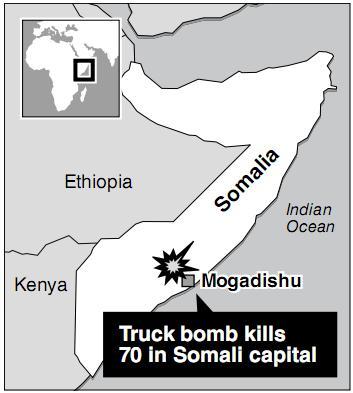MOGADISHU (AP) ― Al-Qaida-linked militants launched their deadliest single bombing in Somalia, killing 70 people and demonstrating how the group that blocked aid to famine victims can still mount devastating violence even after most of its fighters fled the capital in August.
A truck loaded with drums of fuel exploded Tuesday outside the Ministry of Education on one of central Mogadishu’s busiest streets, where students and their parents were registering for scholarships offered by the Turkish government.
Rebels of the al-Shabab militant group immediately claimed responsibility for the bombing, saying it was striking government officials and foreigners ― referring to African Union peacekeeping troops supporting the U.N.-backed regime. Although the Islamic fighters made what they called a “tactical withdrawal” from their bases in Mogadishu amid an AU offensive in August, they had vowed to carry out devastating suicide attacks.
The thunderous blast covered the city in dust more than 800 meters away and left blackened corpses sprawled amid burning vehicles. One woman used a blue plastic bucket to pour water on a charred and smoldering body.
Rescuers rushed scores of victims with burns and severed limbs to Medina Hospital, said nurse Ali Abdullahi. Even in a city beset by war and anarchy for two decades, the bombing horrified medical workers. “It is the most awful tragedy I have ever seen,” he said. “Imagine ― dozens are being brought here minute by minute. Most of the wounded people are unconscious and others have their faces blackened by smoke and heat.”

Duniya Salad sobbed over her brother’s burned body after he died while undergoing treatment. “They killed him before he started university! Why was he killed? Damn to al-Shabab,” she said.
At least 70 people were killed and 42 wounded, said Ali Muse, chief of Mogadishu’s ambulance service. “The explosion has not only affected the targeted place, but even passers-by and car passengers died there. The death toll may increase and we are still carrying many dead bodies,” he said. “It is the worst tragedy I have ever seen in the capital.”
Maj. Gen. Fred Mugisha, the commander of the African Union Mission to Somalia force, known as AMISOM, said the attack targeted several Somali government institutions.
The suicide bomber detonated the explosives after the vehicle rammed a checkpoint outside a compound housing several government ministries, Mugisha said. The attack shows that the danger from terrorists is not yet over and that there are obviously still people who want to derail the advances that the Somali people have made toward peace,” the government statement said.
In a message on a website used by al-Shabab, the group said its “mujahedeen fighters have entered a place where ministers and AMISOM foreigners stay,” referring to the Ugandan and Burundian peacekeeping forces.
Two years ago, al-Shabab was blamed for an attack on a graduation ceremony that killed 24 people, including three government ministers, medical students and doctors.
U.N. Secretary-General Ban Ki-moon said he was “appalled” by Tuesday’s attack, which he called “incomprehensible.”
The attack was “all the more abhorrent coming at a time when Somali political leaders, through efforts such as the recent Mogadishu Conference, have been working together to chart a peaceful political future for Somalia,” said Ban’s spokesman, Martin Nesirky.
The secretary general of the Organization of the Islamic Cooperation, Ekmeleddin Ihsanoglu, condemned what he called a “heinous” attack on civilians.
The U.N. Special Representative for Somalia, Augustine Mahiga, had warned that al-Shabab would resort to guerrilla-style attacks following their retreat.
“Although the extremists have left the capital, it is very difficult to prevent these types of terrorist attacks which we have consistently warned are likely to be on the increase,” Mahiga said. Al-Shabab still holds much of southern and central Somalia.
The attack came as Somalia struggles to rebound from its worst famine in 60 years, a crisis that has brought even more misery to a country mired in violence since 1991.
Al-Shabab fighters have compounded the suffering by preventing aid agencies from helping famine victims in areas under militant control in southern Somalia. The U.S. says 29,000 children have died since the famine began, and the U.N. says 750,000 more are at risk of starving to death in the next few months.
Witnesses say the insurgents even killed men who tried to flee the famine zone with their families, saying it was better for them to die than accept help from the West.
Suicide bombings were unheard of in Somalia before 2007 but have become increasingly frequent. Al-Shabab, which was formed about five years ago, claims allegiance to al-Qaida, which often uses car bombs and appears bent on gaining a greater foothold in the Horn of Africa.




![[Herald Interview] 'Trump will use tariffs as first line of defense for American manufacturing'](http://res.heraldm.com/phpwas/restmb_idxmake.php?idx=644&simg=/content/image/2024/11/26/20241126050017_0.jpg)

![[Health and care] Getting cancer young: Why cancer isn’t just an older person’s battle](http://res.heraldm.com/phpwas/restmb_idxmake.php?idx=644&simg=/content/image/2024/11/26/20241126050043_0.jpg)

![[Graphic News] International marriages on rise in Korea](http://res.heraldm.com/phpwas/restmb_idxmake.php?idx=644&simg=/content/image/2024/11/25/20241125050091_0.gif)